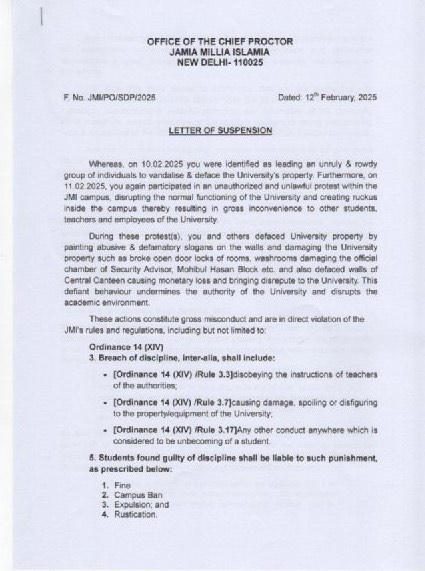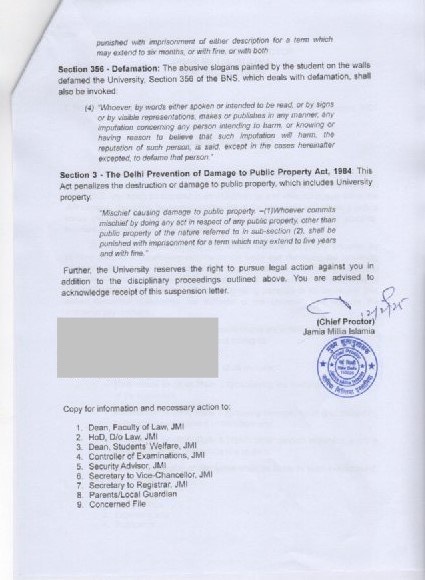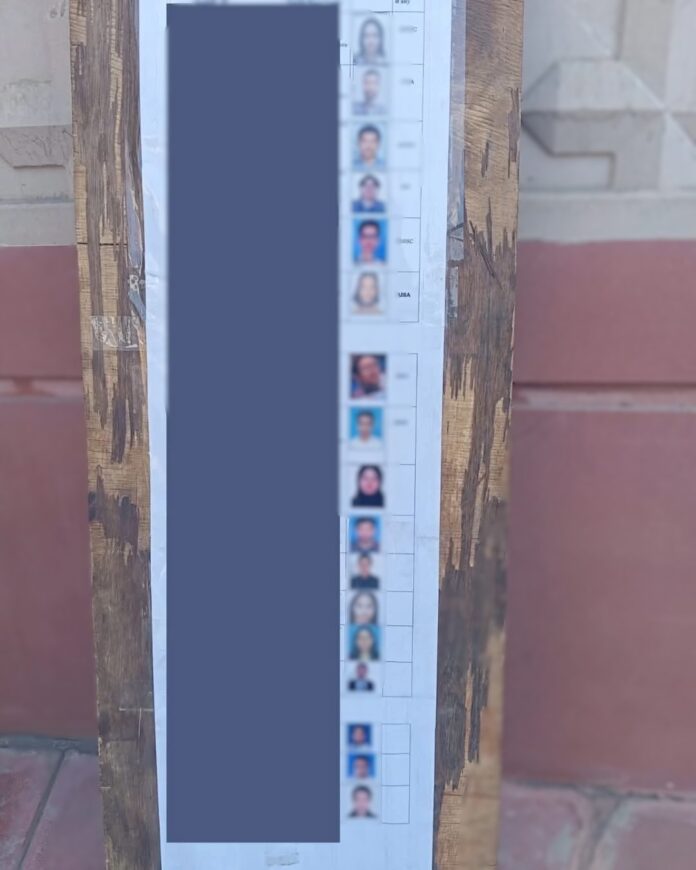Unzila Sheikh, TwoCircles.net
New Delhi: A day after the Delhi Police detained and later released around 12 students protesting at Jamia Millia Islamia (JMI), the university administration on February 14 publicly displayed a list identifying 17 students allegedly involved in the February 10 sit-in protest at Central Canteen. The notice, which appeared on campus at several spots, included names of students, their photographs, email addresses, phone numbers and political affiliations.
Several of them were also issued a letter of suspension from the Chief Proctor’s office on February 12.
Notably, the Supreme court on March 15, 2020 had said publishing photos, names and addresses on hoardings of alleged rioters is a “violation of right to privacy”.
Similarly, the Allahabad High Court too had called such action by the Uttar Pradesh Police “an unwarranted interference in the privacy of people” and ordered removal of the hoardings of those booked in cases of alleged vandalism and arson linked to protests against the contentious Citizenship Amendment Act (CAA) and the National Register of Citizens (NRC).
Reacting to the disclosure of students, Niranjan, a BA-LLB student of the varsity associated with the All India Revolutionary Students Organisation (AIRSO) said the action taken has put the students, particularly women, at severe risk.
Others called the action “irresponsible”. “This irresponsible behavior not only infringes upon our fundamental right to privacy but also exposes us to potential harm,” said another student, Saurabh, who is a Hindi PhD scholar, and belongs to the Jamia unit of the All India Students’ Association (AISA).
The students have been protesting since February 10 against show cause notices issued to four students — Jyoti, Saurabh, Niranjan and Fuzail — for allegedly organising a gathering to mark the fifth anniversary of the police crackdown on Jamia Millia Islamia during the 2019 protest against the controversial CAA-NRC. The university administration deemed the protest “illegal” and issued the notices to the activists.
Despite all four students submitting nearly identical replies to the show cause notice, the student activists claimed that the administration singled out Saurabh, calling his response “unsatisfactory” and initiating a Disciplinary Committee (DC) proceeding against him.
Jyoti too reportedly received a DC notice for allegedly organising an agitation against these “arbitrary” actions of the Jamia administration.
The public notice, issued by Jamia’s proctorial department, revealing students’ identities and phone numbers, stated, “List of active students who organised a protest without permission on 10.02.2025 at 5 pm, Central Canteen, JMI.”
The suspension letters issued to some of the students accused them of leading an “unruly and rowdy group” that vandalised and defaced university property. The letter further stated that on February 11, they again participated in an unauthorised protest, disrupting normal university functioning.
It went on to accuse them of defacing walls with “abusive and defamatory slogans”, damaging doors, washrooms and even breaking into the Security Advisor’s office in the varsity’s Mohibul Hasan Block. The administration claimed these actions caused monetary loss and tarnished the university’s reputation.
Calling it a “breach of discipline”, the letter cited three violations of university rules — disobeying authorities, damaging property and engaging in conduct unbecoming of a student. It warned that the students could face punishments such as fines, campus bans, expulsion and rustication. The administration also reserved the right to pursue legal action.

The letter further referenced the Bhartiya Nyaya Sanhita, 2023, listing legal provisions under which the students’ actions could be prosecuted, including mischief causing damage to property, unlawful assembly and the Delhi Prevention of Damage to Public Property Act, 1984.

“In light of the history of violence on our campus, notably the attack on protesting students on December 15, 2019, this disclosure of personal information is profoundly concerning. It is important to recall that during the 2019 protests (agitation against the CAA and NRC), an armed individual, Gopal Ram Bhagat, opened fire on students near the very gates outside the campus. By making our private information public, the university is facilitating similar threats, including targeted violence, harassment and the risk of lynching,” Saurabh added.
On February 13 at around 5:30 a.m., the students were reportedly dragged out of the protest site – central canteen – and hustled into three police buses parked outside the university’s main gate. The Hindu quoted a source as saying that the university administration had called the police to “maintain law and order”. All 14 students — nine women and five men — were released later in the day.
“At around 5:30 a.m., security guards forcibly removed the students from campus, after which the police detained over 14 students and took them to different police stations,” said Niranjan. He further alleged, “During the three-day protest, the central canteen remained closed, and electricity in the area was cut off. The Jamia administration also locked the toilets, creating an unsafe environment for women students.”
The student activists have demanded the revocation of the Office Memorandum dated August 29, 2022 and November 29, 2024, the withdrawal of Disciplinary Committee proceedings against Saurabh and Jyoti and the revocation of notices regarding postering and graffiti on Jamia’s walls. They also insist on the restoration of campus democracy at Jamia.
The two controversial memorandums at the heart of this conflict, issued on November 29, 2024 and August 29, 2022, banned protests or slogans on campus without prior approval from university authorities. These directives warned that disciplinary action would be taken against violators and forbade demonstrations targeting constitutional authorities or law enforcement without formal consent.
The AISA condemned these measures and called them “an attack on the very essence of a university”. It accused the university administration of succumbing to political pressure from the ruling regime. The Jamia Millia Islamia administration had, according to the AISA, become a “mouthpiece for the BJP-RSS agenda”.
On December 20, the administration allegedly imposed fines of up to Rs 50,000 for reportedly defacing property, citing the Delhi Prevention of Defacement of Property Act (2007) and invoking Section 324 of the Bharatiya Nyaya Sanhita (BNS), which prescribes fines and imprisonment for violators. The AISA, however, argued that these rules were not about maintaining decorum but were part of a broader crackdown on student dissent.
Expressing concerns over students’ safety and security, Saurabh asked, “Given the negative media coverage the Jamia receives as a minority institution and the stigma associated with protests, this action serves as a blatant invitation for harassment or attacks against these students. Who will be held accountable if these students or their family members suffer harm?”
The Jamia administration could not be reached for comments despite repeated attempts.

